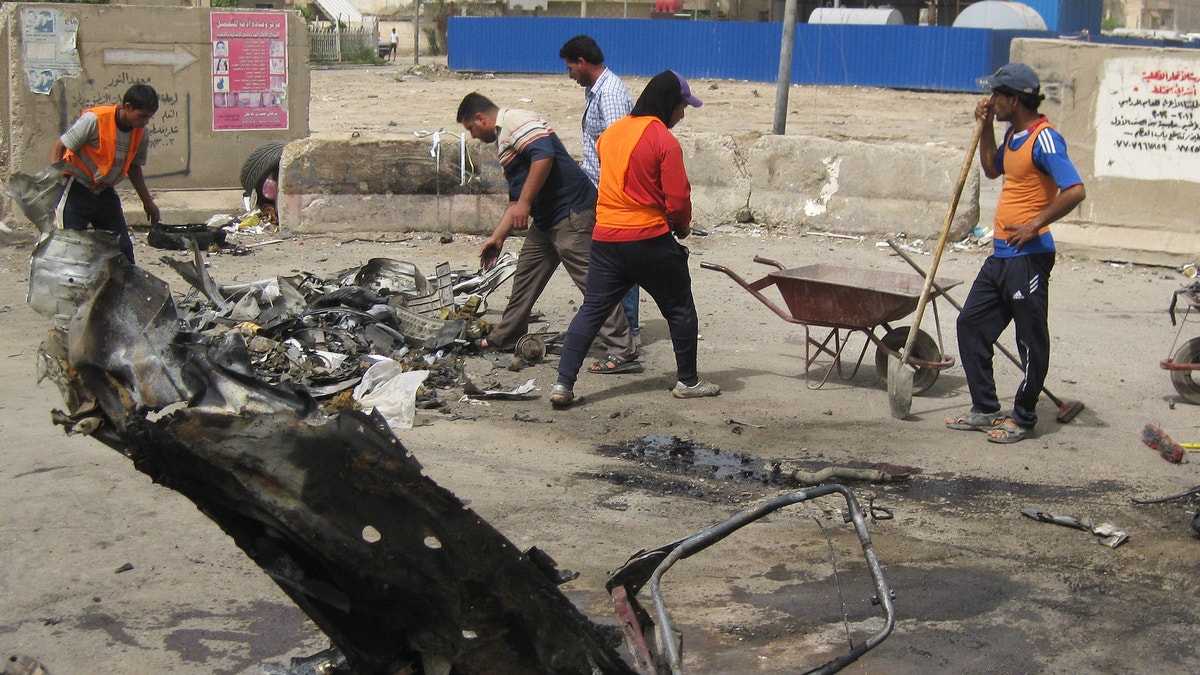
April 19, 2012: Baghdad municipality workers clean up after a car bomb attack in Palestine Street, Baghdad. (AP)
BAGHDAD – Bombings struck several areas in Baghdad and to the north Thursday, killing at least 30 people in the first major attacks in Iraq in nearly a month. The violence stoked fears that insurgents were trying to undermine confidence in the Shiite-led government amid rising sectarian tensions.
In all, officials said extremists launched 12 attacks in the Iraqi capital and in the cities of Kirkuk, Samarra, Baqouba, Dibis and Taji. Mortars were fired into the northern cities of Beiji and Saddam Hussein's hometown of Tikrit, but no injuries were reported there.
Nearly 100 people were wounded in the rapid-fire explosions that unfolded over an hour and 15 minutes. Half of the bombs struck at security forces and government officials -- two frequent targets for insurgents still seeking to undermine Iraq's efforts to normalize after years of war and violence.
There was no immediate claim of responsibility for the attacks, but Baghdad military command spokesman Col. Dhia al-Wakeel said they resembled those carried out by Al Qaeda.
"They want to send a message that they can target the stability that has been achieved recently," al-Wakeel said. "This will not discourage our security forces."
The strikes marked the first major attacks in Iraq in nearly a month, although ongoing political battles between the Shiite-led government and top Sunni and Kurdish officials have threatened to inflame simmering sectarian disputes.
Iraq's Sunni Vice President, Tariq al-Hashemi, is wanted on terror charges that he says are politically motivated, and Kurdish regional leader Massoud Barzani has compared the government in Baghdad to a dictatorship. Aides to Prime Minister Nouri al-Maliki, a Shiite, have dismissed the criticism as baseless.
The single deadliest bombing Thursday came in Dibis, located near the northern city of Kirkuk, 180 miles north of Baghdad. Kirkuk Police Brig. Gen. Sarhad Qadir said a parked car exploded in the Sunni Arab village, killing six passers-by and wounding four.
The day of violence began at dawn with a car that exploded in residential area in the Diyala provincial; capital of Baqouba in eastern Iraq, killing one and injuring 13 people. Within two hours, bombs cropped up across Baghdad, killing eight across the Iraqi capital -- mostly in Shiite neighborhoods.
Baghdad police said roadside bombs and car explosions targeted security patrols and the nation's top health official, Health Minister Majeed Hamad Amin, as his convoy was driving him to work. Amin, an Iraqi Kurd, was not hurt in the attack on his convoy in the capital's west, but two passers-by were killed and six people were wounded.
Police and hospital officials confirmed the Baghdad casualties but spoke on condition of anonymity because they were not authorized to release the information.
In the city of Samarra, police said a suicide bomber blew up the car he was driving at a checkpoint manned by local Sahwa, or Awakening Councils -- the Sunni security militia that was created to help U.S. forces fight Al Qaeda.
Five militiamen were killed and eight wounded in the suicide attack, according to local police and health officials. Violence in Samarra, a mostly Sunni city located 60 miles north of Baghdad, is particularly perilous because it is the site of a Shiite shrine that was bombed in 2006 in an attack that touched off a wave of sectarian clashes around Iraq, claiming thousands of lives and raising worries that Iraq was heading for civil war.
Additionally, two explosions in Kirkuk targeted a police patrol and the head of the provincial investment council, killing three and wounding 21, Qadir said. The investment official, Falah al-Bazaz, was not hurt.
And a roadside bomb in the city of Taji, just north of Baghdad, exploded as a security patrol drove by. One bystander was killed and three policemen were among six people who were wounded in the blast. A half hour later and a few miles away, another roadside bomb killed two soldiers and injured four others as an Iraqi army patrol passed by.
Overall, attacks have dropped sharply nationwide since Iraq threatened to dissolve into civil war five years ago. Violence recently waned since the run-up to the Arab League summit that was held in Baghdad at the end of March. But bombings and deadly shootings across Iraq are still common.
Iraq's fragile coalition government has threatened to break down for months, beginning right after U.S. troops withdrew from the country in late December.
